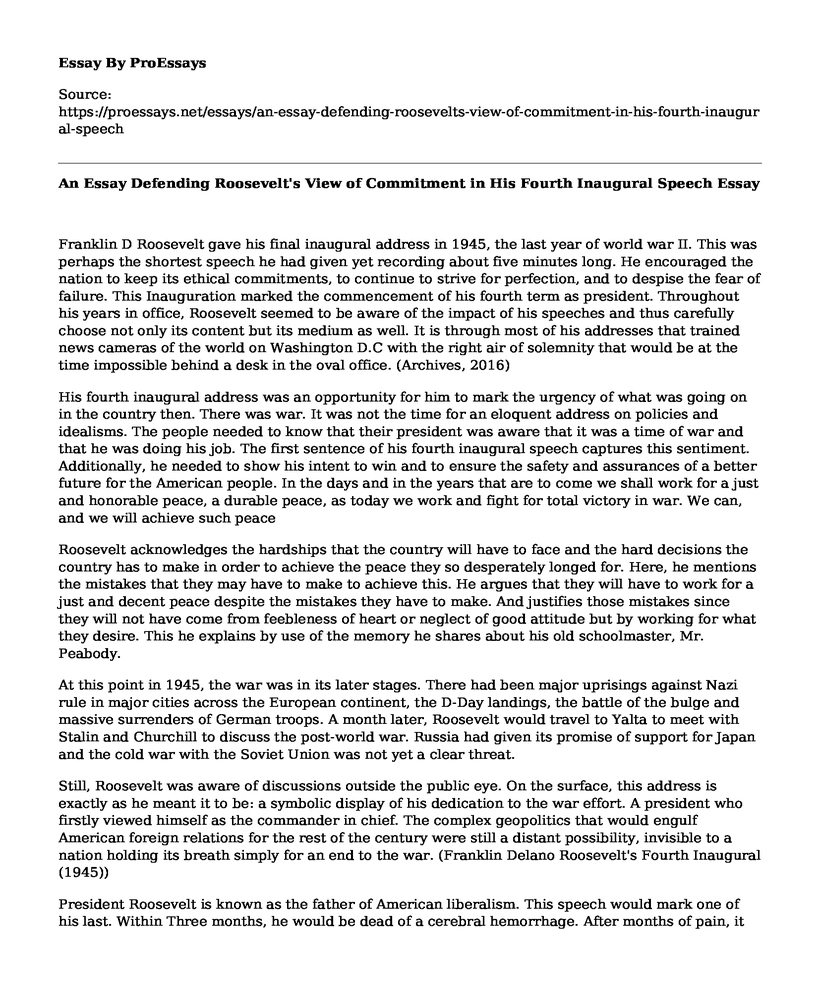Franklin D Roosevelt gave his final inaugural address in 1945, the last year of world war II. This was perhaps the shortest speech he had given yet recording about five minutes long. He encouraged the nation to keep its ethical commitments, to continue to strive for perfection, and to despise the fear of failure. This Inauguration marked the commencement of his fourth term as president. Throughout his years in office, Roosevelt seemed to be aware of the impact of his speeches and thus carefully choose not only its content but its medium as well. It is through most of his addresses that trained news cameras of the world on Washington D.C with the right air of solemnity that would be at the time impossible behind a desk in the oval office. (Archives, 2016)
His fourth inaugural address was an opportunity for him to mark the urgency of what was going on in the country then. There was war. It was not the time for an eloquent address on policies and idealisms. The people needed to know that their president was aware that it was a time of war and that he was doing his job. The first sentence of his fourth inaugural speech captures this sentiment. Additionally, he needed to show his intent to win and to ensure the safety and assurances of a better future for the American people. In the days and in the years that are to come we shall work for a just and honorable peace, a durable peace, as today we work and fight for total victory in war. We can, and we will achieve such peace
Roosevelt acknowledges the hardships that the country will have to face and the hard decisions the country has to make in order to achieve the peace they so desperately longed for. Here, he mentions the mistakes that they may have to make to achieve this. He argues that they will have to work for a just and decent peace despite the mistakes they have to make. And justifies those mistakes since they will not have come from feebleness of heart or neglect of good attitude but by working for what they desire. This he explains by use of the memory he shares about his old schoolmaster, Mr. Peabody.
At this point in 1945, the war was in its later stages. There had been major uprisings against Nazi rule in major cities across the European continent, the D-Day landings, the battle of the bulge and massive surrenders of German troops. A month later, Roosevelt would travel to Yalta to meet with Stalin and Churchill to discuss the post-world war. Russia had given its promise of support for Japan and the cold war with the Soviet Union was not yet a clear threat.
Still, Roosevelt was aware of discussions outside the public eye. On the surface, this address is exactly as he meant it to be: a symbolic display of his dedication to the war effort. A president who firstly viewed himself as the commander in chief. The complex geopolitics that would engulf American foreign relations for the rest of the century were still a distant possibility, invisible to a nation holding its breath simply for an end to the war. (Franklin Delano Roosevelt's Fourth Inaugural (1945))
President Roosevelt is known as the father of American liberalism. This speech would mark one of his last. Within Three months, he would be dead of a cerebral hemorrhage. After months of pain, it would end in a severe stroke. Harry Truman, his vice president, would be left with the greatest power of military force in the world. He would be left alone to steer through the new world of the 20th-century diplomacy: The United Nations, the threat of global communism, weapons of mass destruction and the world looking for American leadership.
Reference:
Archives, N. (2016). Four Presidential Inaugurations. FDR Library and museum.
Franklin Delano Roosevelt's Fourth Inaugral (1945). (n.d.). Inaugral Clock: ALL THINGS PRESIDENTIA
Cite this page
An Essay Defending Roosevelt's View of Commitment in His Fourth Inaugural Speech. (2021, Jun 24). Retrieved from https://proessays.net/essays/an-essay-defending-roosevelts-view-of-commitment-in-his-fourth-inaugural-speech
If you are the original author of this essay and no longer wish to have it published on the ProEssays website, please click below to request its removal:
- The Theme of Slavery in Films Essay
- Lopez Lomong Biographical Essay
- American Horizons Questions Paper Example
- Essay Example on Frederick Douglass: Impact on US History Amidst Major Events
- Essay Example on Adopting National Identity Cards: Pros & Cons
- California's Quest for Freedom: Opposing the Fugitive Act in 1851 - Essay Sample
- Addressing Consumer Privacy: Governments and Businesses Working Together - Essay Sample







